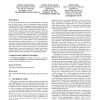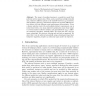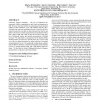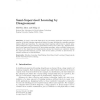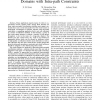1047 search results - page 49 / 210 » Learning the required number of agents for complex tasks |
ATAL
2011
Springer
12 years 7 months ago
2011
Springer
In multi-agent planning environments, action models for each agent must be given as input. However, creating such action models by hand is difficult and time-consuming, because i...
PPSN
2010
Springer
13 years 5 months ago
2010
Springer
The target of machine learning is a predictive model that performs well on unseen data. Often, such a model has multiple intended uses, related to different points in the tradeoff ...
ATAL
2011
Springer
12 years 7 months ago
2011
Springer
Autonomy requires robustness. The use of unmanned (autonomous) vehicles is appealing for tasks which are dangerous or dull. However, increased reliance on autonomous robots increa...
KAIS
2010
13 years 6 months ago
2010
In many real-world tasks there are abundant unlabeled examples but the number of labeled training examples is limited, because labeling the examples requires human efforts and exp...
AROBOTS
2011
13 years 2 months ago
2011
Abstract— Many applications require teams of robots to cooperatively execute complex tasks. Among these domains are those where successful coordination solutions must respect con...
